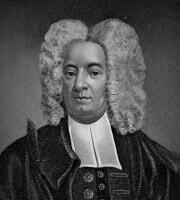About Cotton Mather
Cotton Mather (February 12, 1663 - February 13, 1728, Boston, Massachusetts) was an American Puritan Congregational minister, poet, author, and pamphleteer, son of the Reverend Increase Mather. Cotton Mather quickly distinguished himself by his precocity and obtained his bachelor's degree (B.A.) from Harvard University at the age of 15, in 1678. After his master's degree (M.A.), he joined his father at the North Church of Boston as assistant pastor. He did not become a titular pastor until the death of his father in 1723.Author of more than 450 books and pamphlets, his ubiquitous literary works made him one of the most influential religious leaders in the United States. His most famous work was Magnalia Christi Americana (which may be translated as The Glorious Works of Christ in America), subtitled The ecclesiastical history of New England, from its first planting in the year 1620 unto the year of Our Lord 1698. He thus participated in the development of a form of traditionalist moral discourse and called on the second and third generations of Puritans to return to the theological sources of Puritanism.
Cotton Mather supported his father when he warned the judges of the Salem witch trials against the admissibility of ghost testimonies in his book Wonders of the Invisible World (1693), testimonies of victims of witchcraft claiming to have been attacked by a ghost taking the form of someone they knew. He also had a prominent role in promoting variolation, a method abandoned after the discovery of the vaccine against smallpox, defying the disapproval of the Puritan community and going so far as to inoculate his own son, who nearly died from it. It was from his slave Onesimus that he learned the practice of inoculation.
Cotton Mather died on the day after his 65th birthday and was buried on Copp's Hill Burying Ground, in Boston's North End.
Browse all poems and texts published on Cotton Mather









